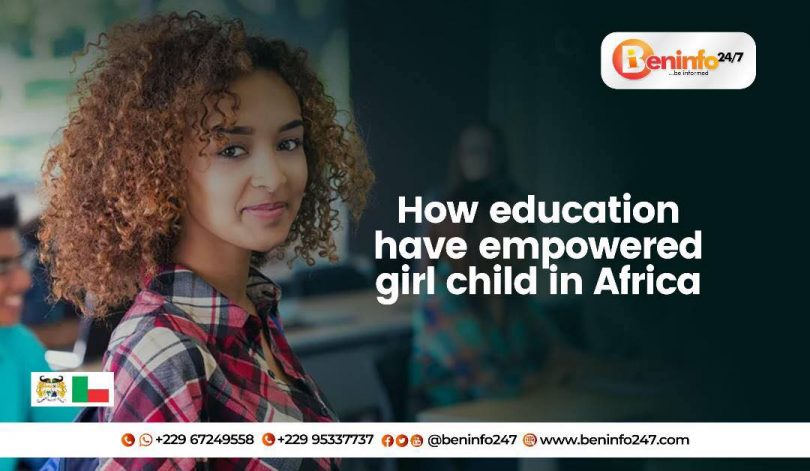How Education Empowers Girls in Africa: A Look at Breaking Gender Barriers and Historical Context
The history of girls’ education in Africa dates back to the colonial era when European powers introduced formal education systems to the continent. However, these education systems were primarily designed to educate boys and prepare them for administrative and technical roles in the colonial administration. Girls were often excluded from these systems or offered limited access to education.
In the post-colonial era, African countries began to establish their education systems, which aimed to provide education to all citizens regardless of gender. Despite these efforts, however, girls’ education continued to face significant challenges due to cultural, economic, and social factors.
One major challenge has been the cultural perception that educating girls is less important than educating boys. This perception is often rooted in traditional gender roles and expectations, which prioritize girls’ domestic duties and limit their opportunities for formal education. This has led to lower enrollment rates for girls in many African countries and a lower level of education attainment overall.
Economic factors have also contributed to the challenges faced by girls’ education in Africa. Poverty and financial barriers make it difficult for families to afford the costs of education, including school fees, uniforms, and textbooks. When families are forced to choose between sending their children to school, they often prioritize boys over girls due to the perception that boys will provide a better return on investment.
Social factors, including gender-based violence, also pose significant barriers to girls’ education in Africa. Many girls face harassment and violence on their way to and from school, and in some cases, this violence is perpetrated by teachers or school administrators. This can create a hostile learning environment that discourages girls from attending school.
Despite these challenges, progress has been made in recent years toward improving access to education for girls in Africa. Many countries have implemented policies and programs aimed at increasing girls’ enrollment in schools and reducing barriers to their education. These efforts have included providing financial incentives for families to send their daughters to school, increasing the number of female teachers and school administrators, and providing safe and secure learning environments for girls.
As a result of these efforts, there has been a significant increase in girls’ enrollment rates and educational attainment in many African countries. However, more work needs to be done to address the remaining challenges and ensure that all girls in Africa have access to quality education. By continuing to invest in girls’ education and breaking down gender barriers, we can help create a brighter future for girls and their communities across the continent.
“Breaking Gender Barriers: Empowering Girl’s Education in Africa”:
Gender inequality remains a significant issue in many African countries, particularly in terms of education. Girls are often at a disadvantage when it comes to education due to social norms and traditions that prioritize boys’ education over girls. However, empowering girls’ education in Africa can have significant benefits for both individuals and society as a whole.
Importance of Breaking Gender Barriers in Education
-
Improved Health Outcomes:
Educated girls are more likely to lead healthier lives and make informed decisions about their health and well-being. They are also more likely to access healthcare services and have healthier families.
-
Economic Empowerment:
Girls’ education is crucial for economic growth and development in Africa. Educated girls are more likely to enter the workforce and earn higher incomes, which can help lift them and their families out of poverty.
-
Reduction in Gender-Based Violence:
Educated girls are more likely to be aware of their rights and stand up against gender-based violence, which remains a significant issue in many African countries.
-
Increased Political Participation:
Educated girls are more likely to participate in political processes and have a greater say in decision-making processes that affect their lives and communities.
-
Improved Literacy Rates:
Educated girls are more likely to be literate, which can improve their ability to participate in society and access information and resources.
Ways to Empower Girl’s Education in Africa:
-
Eliminating Gender Stereotypes:
Gender stereotypes often lead to girls being discouraged from pursuing education. Addressing and eliminating these stereotypes can help create a more supportive environment for girls’ education.
-
Increasing Access to Education:
Improving access to education, including increasing the number of schools and teachers, can help ensure that more girls have the opportunity to pursue an education.
-
Providing Safe Learning Environments:
Many girls face harassment and violence on their way to and at school. Providing safe and secure learning environments can help encourage more girls to attend and stay in school.
-
Addressing Financial Barriers To Girls’ in Africa
Poverty remains a significant barrier to girls’ education in Africa. Addressing financial barriers, such as providing scholarships and reducing the cost of education, can help ensure that more girls have access to education.
Conclusion:
Breaking gender barriers and empowering girls’ education in Africa is crucial for promoting individual and societal development. By improving access to education and addressing social, cultural, and economic barriers, we can ensure that more girls have the opportunity to pursue their dreams and make a positive impact in their communities.
In addition to the importance and ways of empowering girls’ education in Africa, it’s essential to understand the historical and cultural context surrounding gender inequality in education. Throughout history, girls’ education in Africa has been undervalued and neglected, leading to a significant gap in educational attainment between boys and girls.
Despite significant progress in recent years, gender inequality in education remains a significant issue. In many African countries, girls face cultural barriers such as early marriage and domestic responsibilities, which often lead to dropping out of school.
Moreover, poverty remains a significant barrier to girls’ education. Families facing economic hardship may prioritize boys’ education, as they are seen as a more significant source of income. Additionally, inadequate infrastructure and insufficient funding for schools in remote and rural areas disproportionately affect girls’ education.
To address these challenges, governments, NGOs, and other stakeholders must prioritize and invest in girls’ education. They can provide financial support, such as scholarships, to help girls access and complete their education. Furthermore, addressing cultural and social barriers through community-based programs and initiatives can help shift attitudes toward girls’ education.
In conclusion, breaking gender barriers and empowering girls’ education in Africa is crucial for promoting individual and societal development. By addressing the historical and cultural context, understanding the importance, and implementing effective strategies to improve access and address barriers, we can create a more equitable and just society for all.




 Protected by Patchstack
Protected by Patchstack